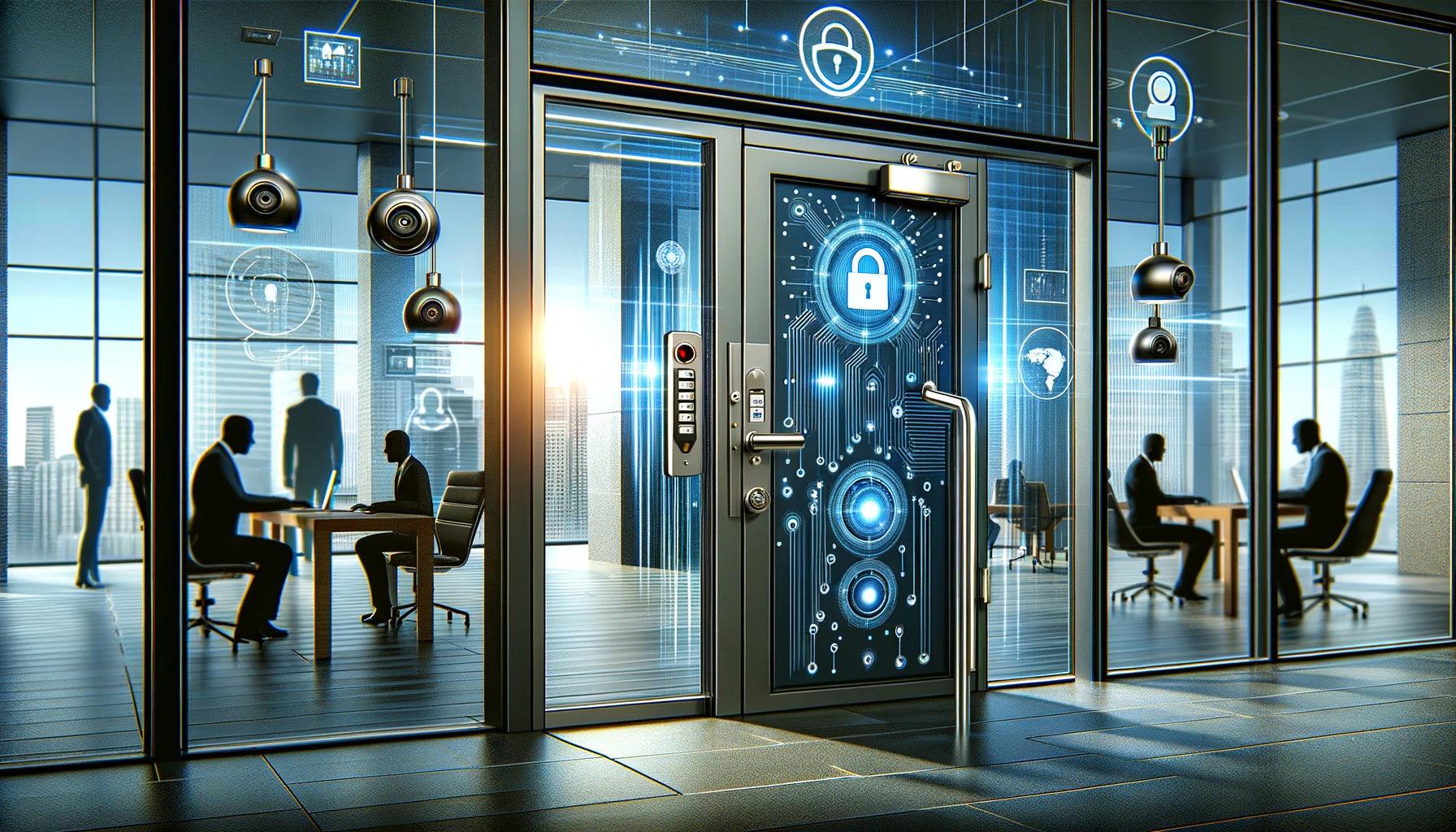The Importance of Robust Security Doors in Business
In today’s business world, security remains a paramount concern, particularly physical security, which forms the first line of defence against intrusions and theft. One of the most critical components of a robust security system is the security door. These doors are not merely points of entry and exit but pivotal elements designed to withstand forced entry, ensure privacy, and protect valuable assets. This blog explores the significant role that bullet proof doors play in business environments, discussing their features, benefits, and the peace of mind they offer to business owners.
The Basics of Security Doors
Security doors are specially designed to prevent unauthorised access and can significantly differ from standard doors in their build and capabilities. Typically, these doors are constructed from stronger materials like steel or reinforced aluminium, which are much harder to damage or destroy than traditional wooden or light metal doors. Besides superior materials, anti bandit doors often feature complex locking mechanisms that go beyond standard lock-and-key systems to include magnetic locks, deadbolts, and even biometric systems that provide an additional layer of security.
The design of security doors also includes several layers of security enhancements such as reinforced frames, hinges, and anti-tamper features that make the doors not just resistant to breaking and entering but also to subtler forms of tampering. Security doors come in various grades and strengths, tailored to the specific requirements of an establishment, whether it’s a high-risk zone requiring very high security or a less vulnerable location needing moderate protection.
Key Features of High-Security Doors
The effectiveness of a security door largely depends on its features. Key aspects include multi-point locking systems that secure the door at several points on the frame, which spreads out any force applied to the door, making it harder to breach. Advanced security doors, like Strong room doors also include features such as drill-resistant plates, reinforced steel edges, and ballistic-rated materials designed to withstand gunshots and heavy impact.
Another crucial feature is the locking mechanism. Modern security doors often employ electronic locking systems that can include keypad entry, card readers, or biometric systems like fingerprint and retinal scanners. These technologies not only enhance security but also offer a level of customisation and control over who can access certain areas within a business environment.
The Role of Security Doors in Deterrence
Security doors serve as a powerful deterrent to potential intruders. Their robust and imposing appearance signals to potential burglars that a property is well-protected, often leading them to abandon any attempt at entry. The psychological barrier created by a high-quality security door should not be underestimated; it represents a clear statement from the business about its commitment to security and can be enough to steer potential threats towards easier targets.
Moreover, the visible presence of security doors, especially those equipped with advanced technology and heavy-duty materials, can make a significant impact on a company’s overall security stance. Employees and customers alike feel safer, knowing that the premises are secured against external threats, which can enhance the business’s reputation for reliability and safety.
Material Choices for Security Doors
The choice of material for security doors is crucial and depends on the specific security needs of a business (like fire doors). Steel doors, like record room doors, for example, offer high resistance to physical attacks and are ideal for areas requiring stringent security measures. They are tough, durable, and provide excellent protection against attempts at forced entry. Aluminium doors, while lighter than steel, can also offer substantial protection and have the added benefit of being resistant to corrosion, making them suitable for businesses in harsh environments or coastal areas where corrosion is a concern.
Composite materials are another option, combining wood, steel, and other materials to offer a balance between aesthetic appeal and security functionality. These doors can be customised to match the exterior of a business while still providing a high level of security. Each material offers different benefits, and the choice often depends on a combination of security needs, aesthetic considerations, and budget.
Technological Enhancements in Security Doors
Technological advancements have significantly enhanced the functionality and security level of doors. Modern security doors can be equipped with state-of-the-art technology such as biometric scanners, which use unique biological features like fingerprints or eye scans to allow entry, making unauthorised access nearly impossible. Smart doors, which can be controlled remotely via smartphone apps, enable real-time monitoring and control, allowing business owners to lock and unlock their doors from anywhere in the world.
Additionally, many security doors now come with integrated alarm systems that immediately alert the business owner or local law enforcement to attempted breaches. These technological enhancements not only improve the security of a door but also integrate seamlessly with broader security systems, providing a comprehensive security solution that protects against a variety of threats.
Regulatory Standards for Security Doors
Security doors in the UK and Europe must adhere to specific standards to ensure they provide a reliable level of protection. These regulations, such as the British Standards BS 7950 (for windows) and PAS 24 (for doors), specify the minimum requirements
for the performance of security doors in resisting various forms of attack. Compliance with these standards is crucial not only for ensuring the effectiveness of the doors but also for meeting insurance requirements.
In addition to national standards, European norms like EN 1627 to EN 1630 specify the resistance levels of doors to different types of attacks, including manual attacks, the use of tools, and even vehicular impact. Businesses need to understand these standards to choose doors that meet their specific security needs and comply with local and international regulations.
Integration with Other Security Systems
An effective security strategy involves the integration of various components into a cohesive system, and security doors are no exception. Integrating security doors with other security measures such as CCTV systems, motion detectors, and alarm systems creates a layered defence strategy that significantly enhances overall security.
This integration allows for coordinated responses to security breaches; for example, if an attempt to force open a security door is detected, CCTV cameras can automatically direct their focus to the area, capturing images or video of the intruder. Additionally, integrating systems can allow for functionalities like centralised control rooms from which all security activities are monitored and managed, enhancing the ability to respond swiftly and effectively to incidents.
Customisation Options for Security Doors
Security doors offer extensive customisation options to meet specific business needs and aesthetic preferences. This includes choices in colour, finish, and design that can complement the business’s exterior and interior design. Customisable features also extend to the types of locks, the inclusion of peepholes, door handles, and even the type of glass used in doors with windows.
These customisation options allow businesses not only to enhance their security but also to maintain brand consistency and visual appeal. Whether a company prefers a minimalist design or something that stands out, manufacturers can tailor security doors to suit these needs without compromising on security.
Maintenance and Upkeep of Security Doors
Maintaining security doors is crucial to ensure they continue to function effectively and provide the maximum level of security. Regular maintenance tasks include checking and tightening hinges, ensuring locks function smoothly, and inspecting for any signs of wear or damage. It’s also important to check electronic components such as batteries in digital locks and connections in integrated security systems to ensure they are functioning correctly.
Scheduled professional inspections can also help in identifying potential issues before they become serious problems. Businesses should have a maintenance schedule that includes periodic checks by qualified professionals to maintain the integrity and functionality of their security doors.
Cost vs. Benefit Analysis of Investing in Security Doors
While the initial cost of high-quality security doors can be significant, the long-term benefits they provide often justify the investment. These benefits include enhanced security, reduced risk of theft and break-ins, and potentially lower insurance premiums due to improved security measures. Over time, the cost of a security door can be offset by the savings from these benefits, making it a wise investment for businesses looking to protect their assets and ensure the safety of their employees and customers.
Additionally, the presence of robust security measures such as high-quality security doors can enhance the business’s reputation, signaling to clients and partners that the company takes security seriously. This can lead to increased business opportunities and customer trust, further adding to the benefits of investing in high-quality security doors.
Security Doors and Insurance Premiums
Installing certified security doors can lead to lower insurance premiums for businesses as insurers recognise the reduced risk of break-ins and theft. Insurance companies often provide discounts to businesses that take proactive steps to secure their premises, and having certified security doors is a significant factor in this assessment.
Moreover, in the event of an incident, having robust security measures in place can expedite claims processing and potentially lead to favourable outcomes for the business. Thus, not only do security doors provide a physical barrier against threats, but they also offer financial benefits through reduced insurance costs.
Security doors are an indispensable component of a comprehensive business security strategy. They provide not only a physical barrier against intruders but also serve as a deterrent to potential security breaches. With options for customisation, integration with other security systems, and the ability to meet stringent regulatory standards, security doors offer businesses a reliable and effective way to protect their premises, assets, and people. Investing in high-quality security doors is a wise decision that pays dividends in security, peace of mind, and financial benefits through reduced insurance premiums and enhanced business reputation.




